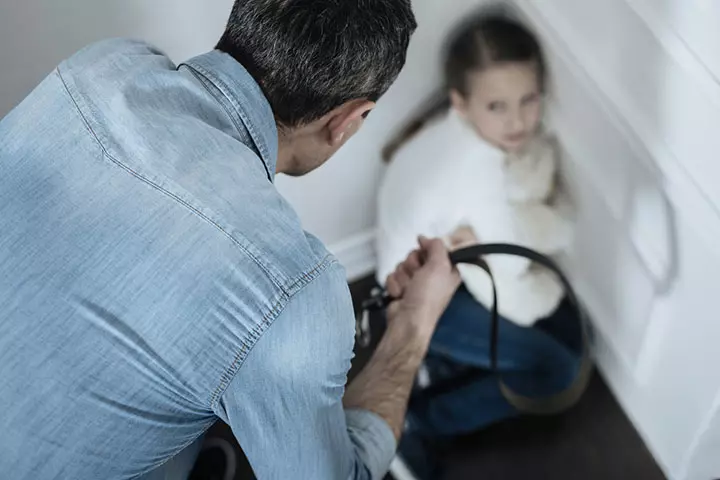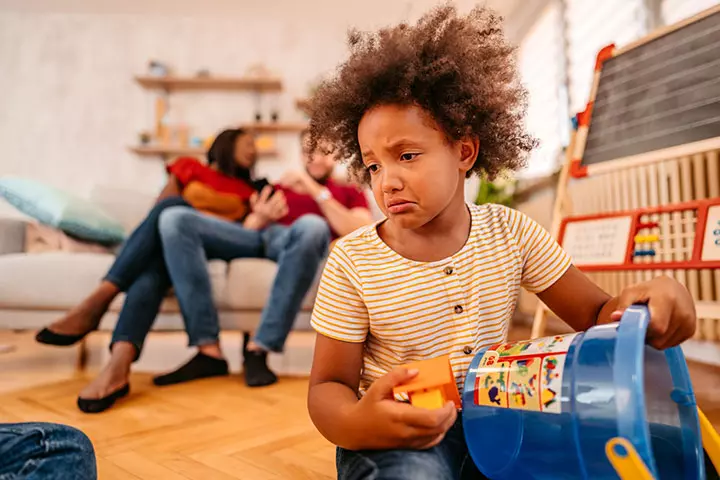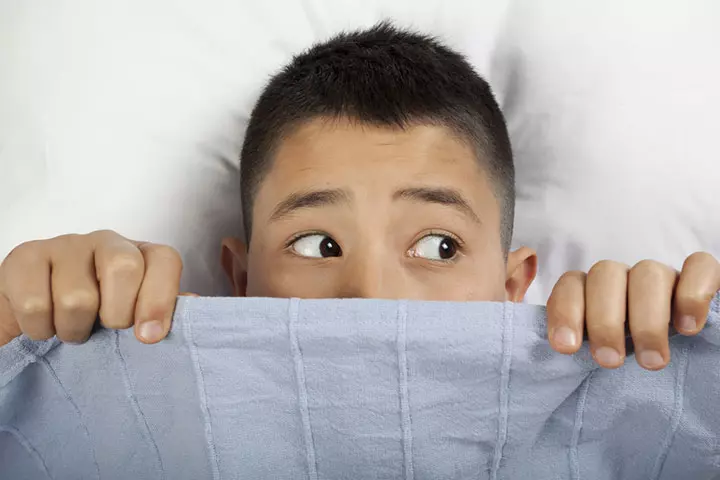
Image: Shutterstock
Emotionally abusive parents could leave invisible mental scars that can sometimes last lifelong. Emotional abuse is the psychological pressure they use on children to get their work done. It could be isolation, humiliation, and intimidation (1). Some examples of abusing a child mentally are calling them names, inflicting severe punishments, constantly picking on them, making them feel worthless, neglecting, and ignoring them.
Such behavior could impact their growing minds and have a drastic impact on their personality. Emotional abuse can be just as harmful as physical abuse, and it often causes lasting emotional harm. Read on as we help you understand the signs of emotionally abusive parents, their side effects, and how to deal with such a situation.

Key Pointers
- Emotionally abusive relationships with parents can leave several adverse effects on a child’s mental health.
- Frequent criticism, scolding for no reason, using violence to discipline the children, etc., are some examples.
- Seeking help from other family members or professionals can help you deal with parental emotional abuse.
Examples Of Emotional Abuse
To identify emotionally abusive parents, you first need to understand what emotional abuse entails. The following are a few examples of emotional abuse.
- Undermining a child’s success or achievement
- Frequent criticism, humiliation, and shaming
- BelittlingiMaking someone feel worthless. a child by comparing them with others
- Calling them demeaning names
- Saying they are ‘good for nothing’ or ‘useless’ or calling them a mistake
- Scolding them for minor mistakes
- Threatening them with dire consequences if they fail to do something
- Refraining from physical contact such as hugging, kissing, or any other way of showing affection
- Blaming them for anything that goes wrong
- Pushing them too hard to achieve forcefully imposed aims and targets
- Ignoring them and their needs
- Not appreciating their efforts or hard work
- Exposing them to first hand or second-hand violence

15 Signs Of Emotionally Abusive Parents
Let’s have a look at some of the most common signs of emotional child abuse by parents to understand such behavior. Noticing these signs is the first step to dealing with the problem. If any of these behaviors seem familiar, it’s important to reach out for support or professional help (2) (3) (4) (5).
1. They are moody
Emotionally abusive parents can be unpredictable and moody. They may appear calm and loving one day and angry and cold the next day. Their constant mood swings can make a child feel like they are walking on eggshells because they do not know what might trigger their parents. This stress can cause anxiety in children at a young age.
2. They blame their child for their problems
When they don’t get a promotion at work, they blame their child for being a distraction. If they have an accident, they blame the child, claiming that they were rushing to pick them up from school. Abusive parents are unsympathetic and rarely accept responsibility for their shortcomings. They always blame it on someone else. It happens so frequently that the child begins to believe that they have indeed ruined their parent’s good life.
 Trivia
TriviaThe US National Syndromic Surveillance Program recorded a significant increase in weekly emergency department (ED) visits for child neglect or abuse during the pandemic, as shown in the accompanying graph.
According to the data, the rise in ED visits began shortly after the emergency declaration in 2025. A prominent reason for it could be pandemic-induced restrictions, which forced people to stay indoors, potentially leading to increased parental stress.
3. They treat necessities as privileges
Some abusive parents make their children believe they are better off than other children when that is not the actual case. For example, they call their children derogatory names. When a child speaks against it, the abusive parents will make necessities, such as food and clothing, appear as enormous favors bestowed on the children.
4. They serve destructive criticism
Constructive criticismiOffering feedback in a specific, actionable manner while being kind and friendly. is essential to children’s growth and development. Some parents, however, use invalidating theory and criticism as a weapon to destroy their child’s confidence and self-worth. They are difficult to please and see only flaws in their child. Even if the child performs well in an activity, they highlight the smallest error in their performance and overlook the fact that the child did well.
5. They pay no heed to emotions

Abusive parents do not value the emotions of their children. For example, if they mention an embarrassing habit of their child to their friends and the child becomes irritated or begins to sulk, they dismiss them as being overly sensitive. Their belittling nature lets them make fun of the child for being weak and unable to laugh at a joke.
6. They compare their child with other children
It makes no difference if their child graduates with honors. If their cousins were valedictoriansiA graduate who scores the highest in a class and delivers a speech at the graduation ceremony. , the abusive parents would not recognize their child’s achievements. If not cousins and siblings, they will compare their children with their neighbors’ and friends’ children. They will dismiss and belittle the child’s best efforts. Even the best may not be enough for the abusive parents.
7. They encourage sibling rivalry
Abusive parents tend to foster sibling rivalry in large families with many children. They make their children compete for their love and affection. As a punishment for losing, the child is frequently isolated and shunned. This causes resentment among children and impacts their perception of family bonding.
8. They tease and call you names
If a child is easily startled, their abusive parents call them ‘scaredy-cat.’ If the child is short, the parents make fun of them in front of others. Abusive parents don’t think twice before bullying, teasing, and using sarcasm to make the child an object of ridicule. They do it for fun and expect their children to put up with their demeaning behavior. Abusive parents believe it is harmless to indulge in name-calling and teasing. They do not understand that the effects of verbal abuse on children can be profound, leading to long-term emotional and psychological damage that affects their self-esteem, relationships, and overall well-being.
9. They are passive-aggressive
Passive-aggressive behavior occurs when a person appears fine on the outside but radiates cold energy from within. They try to avoid conflict. An emotionally abusive parent acts as though everything is fine and relaxed but will refuse to help or guide their children when they need and seek it. The bewildered child will be left wondering if they did something bad or said something harsh, and the abusive parents will not give any explanation for their behavior.
10. They neglect their children
Parenting can be difficult, especially for parents who have multiple responsibilities. However, emotionally abusive parents have an uncaring attitude and neglect their children even if there is no plausible reason. They are often so preoccupied with their adult lives that caring for their children becomes a chore for them, making them stay uninvolved in their children’s lives. They become neglectful of the child’s needs and regard their presence as unimportant in the family.
11. They guilt trip children too often
Most emotionally abused children have probably heard their parents say, “I gave up so much for you, and this is what I get in return.” Making a child feel guilty is a common tactic used by abusive parents. It is parents’ responsibility to provide the best possible care and make sacrifices if required for their children.
However, using it as a tool to get the child to follow the rules is incorrect.
12. They are present physically, not emotionally

Parents may be at home or around their children most of the time, but somehow they are not always available. It means that such parents are ignoring their children and are preoccupied with their daily chores and duties. They are unapproachable and are either on the phone or working. They do not interact with their child and are not available for them emotionally.
13. They use their child to take revenge on the ex-spouse
If a couple is separated, their children become a commodity to be used against the former spouse. For instance, if the mother is living with her new spouse, the father will encourage the child to foster mistrust between the mother and her new partner. He may be manipulative and ask the child to spy on the mother and get information about her. Some parents even poison their children’s impressionable minds to cause trouble for their ex-spouse. This may seriously damage the child’s perception of love and family.
14. They deny privacy
Abusive parents may intrude on their child’s privacy or deny them the ability to make their own decisions. When parents become overly involved to the point where the child feels suffocated, it becomes emotional abuse. Such parents disregard personal boundaries and are highly critical of their child’s decisions.
 Point to consider
Point to consider15. They force their children to be what they want
Abusive parents see their children as an extension of themselves and not as individuals in their own right. They want their child to succeed in fulfilling their unfulfilled dreams. Such controlling parents are more likely to want their children to achieve goals that they could not achieve. They do not take their child’s desires, preferences, and temperament into consideration and coerce them to bend to their will. They live vicariously through their children.
Effects Of Emotional Abuse By Parents
According to a study published by the American Psychological Association, children subjected to emotional abuse are likely to battle mental health problems such as anxiety, depression, low self-esteem, and lack of empathy (6).
Therapist Jackie Re opines, “Children raised by emotionally abusive parents often develop ’emergency solutions’—coping mechanisms that helped them survive emotionally as children, but can become barriers to healthy relationships in adulthood. These patterns may manifest as fear of abandonment, people-pleasing, or difficulty trusting others.”
The following are some health problems they are likely to develop as they grow older (7) (3) (4).
- Children: As children, their developmental process will be affected because they cannot adjust emotionally and psychologically. Children may grow frail from the refusal to eat. Their frail state may affect their normal development in areas such as walking, talking, and non-verbal communication. Younger children may even regress into older phases of development and start bedwetting or thumb-sucking. Abuse may also delay or deter the child’s emotional development. Toddlers affected by parents withholding affection may indulge in behaviors that may further provoke negative interaction. They may also find ways to seek positive or negative attention from other adults around them, such as teachers, family, and neighbors. School-going children may also lack academic concentration, leading to poor grades. Some children may even develop signs of physical symptoms such as headaches and other pains that do not have any medical indications.
- Teenagers: As children grow into preteens and teens, they may begin losing interest in what they used to once enjoy performing. They may even begin expressing antisocial behaviors such as bullying, name-calling, aggression, and substance use. Furthermore, as teenagers, it is difficult for children who are emotionally abused to establish interpersonal relationshipsiA strong or close association between two or more people. . They cannot trust others, nor can they deal with the complex emotions experienced in their teens.
- Adults: As young adults, victims of abuse may engage in vandalism and other similar delinquent behaviors. They may also turn into physically and sexually aggressive individuals. As adults, they cannot cultivate empathy and cannot recognize the needs and feelings of others, and thus, they might emotionally abuse their children. They may also experience psychological symptoms that meet the diagnostic criteria for anxiety, depression, and other mental disorders.
The following are some emotional, psychological, and physical problems that emotionally abused children are likely to develop (8).
- Resorting to harmful coping strategies such as self-harm and nail-biting
- Suffering from mental and physical health disorders
- Battling different phobias

- Exhibiting destructive, aggressive, or anti-social behaviors
- Indulging in substance abuse
- Experiencing sleep or eating disorders
- Finding difficulty in self-expression
- Developing learning or speech disorders
- Engaging in risky sexual behavior
- Having suicidal thoughts
- Lacking self-confidence
- Showing anger issues
How To Deal With Emotional Abuse From Parents
Irrespective of its extent and severity, emotional and psychological abuse by parents influences how children cope with different situations. While the coping strategies one develops as a child may work until a certain age, they may gradually turn unhelpful and detrimental in adulthood. Thus, you may need new methods to manage the effects that abuse has had on you. If you notice the signs of emotional, psychological, and physical problems mentioned above, here are some ways you can deal with the situation (9) (5).
1. Identify the pattern of abuse
First, recognize your parents’ problematic attitude or behavior as emotional abuse. Then, determine their pattern of abuse. For instance, if they are running low on finances at the end of the month, they may lash out at you in frustration. In such cases, keep your interactions with them to a minimum. If they initiate a conversation, keep your responses brief and try to leave the room when you suspect that they will start rejecting you and abusing you.
2. Change your reaction
As emotional abuse or unsupportive behavior can harm your mental health, it is best to distract yourself. When you are yelled at for no reason, you may want to retaliate or cry but desist from doing so. Responding negatively or having an unresponsive nature can have an adverse impact on your health. Instead, leave the room and try to relax by focusing on your breathing. Take a deep breath and visualize yourself in a peaceful setting.
Shivashankari Bhuvaneshwaran, recalls her experience of standing up against her emotionally abusive father in her blog. She writes, “While it was impossible for me to change my dad, I can work on changing myself. I detached myself from the web of guilt that my dad kept me confined it. I stood up for myself and never backed down. It was excruciating and it did not happen overnight. My slow yet steady battle made it clear that I was not that teary-eyed teenager anymore. He was not ready to relinquish the helm of control. I had to endure several fights, shouting matches, and more, to make him tame. Now and then, he does start to act out. My lack of fear and strong resolution make his temper tantrums fade away soon, without much damage (i).”
3. Remember it is not your fault
Even if your parents repeatedly blame you for their misfortunes in life, remember that it is not your fault. You are not responsible for their oppressive actions, regardless of what they say or how they act. It is their inner battles with themselves that manifest as abuse, and it has nothing to do with you.
4. Try to talk to them

If you have the opportunity, and your parents are in a good mood, try to speak to them. Tell them how the abuse or passive-aggressive intimidating behavior makes you feel and how you cannot deal with it. Explain to them how their actions affect your physical and mental health and ask them to change for your sake. This conversation may not be easy, but you have to do it to safeguard yourself.
 Quick tip
Quick tip5. Keep some distance from them
If they do not change even after having a dialogue, it is best to limit your interaction with them and maintain distance. Try to keep yourself busy with enjoyable activities that will keep you away from your parents.
Caroline Mellor, a mother and writer, talks about dealing with an emotionally abusive mother and how establishing distance and cutting off contact has been instrumental in her healing process. She shares, “I’m still in the woods, and not sure what the future holds. But cutting ties has given me the space to start healing for now. Some things will always just hurt, but I feel stronger and more centered, happier, and have more creative energy than ever. I feel sad knowing how all this stems from my mother’s own wounds and untreated mental health issues and I am sorry that her life and the world have made her this way. But while these things are all cause for compassion, they are no excuse for abuse. I will always love my mum, but I owe it to myself and my children to break a destructive cycle which spans generations and to choose truth and self love instead (i).”
6. Talk to an elder or a professional
If nothing else seems to be working, try talking to an elder or a teacher or seek professional assistance. They may or may not be able to change the situation for you, but they may be able to assist you in finding healthy coping mechanisms or guide you in taking care of your mental and physical health.
Tips To Support Emotionally Abused Children
As friends or family, you may be able to identify signs of emotional abuse in children. In such instances, you may help the child in the following ways (9) (10).
1. Talk to the child to identify which parent abuses them.
This will not only help you understand who is abusing whom but will aid in ascertaining the frequency and severity of abuse. Gently probe them to talk more about the abuse to determine if it is just emotional or co-occurring with other forms such as physical, verbal, or sexual abuse.
2. Provide a safe space for them to express their emotions freely.
Reassure them that they are safe with you and that anything that they reveal to you will not be reported to their abuser. Provide the child with a non-judgemental space, empathize with them, and actively listen to them.
3. Do not pressure the child into trusting you immediately.
Avoid coercing, threatening, or making the child feel cornered into revealing what is happening to them. Patiently allowing the child their space and time may help you gain their trust.
4. Share any realistic experiences of your own.
If you have had any similar experiences of your own, share some instances without divulging graphic details. Keep the instances age-appropriate to avoid scaring the child. Avoid making up stories or fabricating parts of the story with lies, as this will encourage mistrust.
5. Provide the child with materials to write down their experiences.
Buy the child a journal in which they can record both positive and negative instances of their daily life. Encourage them to also include what these events make them think and how they feel. If the child is too young, they may even draw whatever they feel or think.
6. Equip the child with the knowledge to cope.
Reassure the child that they are not responsible for their toxic family dynamics or the abusive behavior of their parents. Facilitate the child with the information to cope with the abuse and fight their way out of it. Teach them how to face their fears and their abuser without internalizing their harsh treatment.
7. Consider seeking professional help that best suits the child’s needs.
Depending on whether the child needs rescue from danger or recovery from trauma, call either the child protection services or a mental health service professional. You may also consider calling for medical help if the child appears physically injured from inflicted abuse or self-harm.
Frequently Asked Questions
1. Can abusive parents cause PTSD?
Family conflicts and parental abuse could cause PTSDiA mental health disorder experienced by an individual following traumatic or terrifying life events. in children. The nature of the incident and the amount of stress it puts a child under during their childhood could impact the degree of PTSD a child has experienced (11).
2. What does emotional abuse do to the brain?
Emotional abuse may cause thinning of certain parts of the brain. Childhood abuse might have an adverse impact on the amygdala, the structure in the brain that responds to threats. Abuse at an early age might also thin the brain’s gray matter (12).
3. Is it okay to cut off emotionally abusive parents?
Deciding to cut off from an emotionally abusive parent is a significant and profoundly personal choice influenced by individual circumstances and well-being. When deciding, one must consider elements like the severity and patterns of the abuse, emotional well-being, attempts at redress and reconciliation, and support system. To help you through this predicament, you should also seek advice and support from qualified therapists and counselors.
4. What are some legal options for a child who has experienced emotional abuse by their parents?
Various legal remedies are available to safeguard a child’s safety and well-being if they have been the victims of emotional abuse by their parents. Their legal frameworks might differ depending on the jurisdiction, such as contacting Child Protective Services, getting restraining orders, changing the custody arrangement, and applying for legal guardianship.
It is difficult to identify if you are being raised by inconsiderate parents, especially when you are a single child. But once you identify it, do not wait or hesitate to seek help or protect yourself from their unkind nature. Know that it is not your fault, so don’t accuse yourself at any point in life. Try to figure out the root cause or triggering factors of emotional abuse. It is not okay to tolerate it under any scenario. Reach out to people you feel safe around and seek help.
Infographic: Helping A Child Facing Emotional Abuse At Home
Recognizing emotional abuse from parents can be tricky. Even when it is noticed, it often goes unresponded as people don’t know the right way to intervene and save a child from their parents. While reporting a parent (or parents) for child emotional abuse can be difficult, it isn’t impossible. Whether you are a grandparent, family member, teacher, neighbor, or mere acquaintance, you can protect children from emotional abuse if you report it promptly.
Some thing wrong with infographic shortcode. please verify shortcode syntax
Are you worried your parents may be abusive? In this eye-opening video, we delve into the 8 subtle signs of an abusive parent.
Personal Experience: Source
MomJunction articles include first-hand experiences to provide you with better insights through real-life narratives. Here are the sources of personal accounts referenced in this article.
i. Overcoming the Effects of an Abusive Childhood.https://medium.com/the-ascent/overcoming-the-effects-of-an-abusive-childhood-32759505c4fb
ii. When going no contact with an emotionally abusive parent is the only option.
https://medium.com/family-matters-2/when-going-no-contact-with-an-emotionally-abusive-parent-is-the-only-option-4fd3d88be515
References
- What is child abuse?; NSPCC
- Child Abuse: Emotional Abuse by Parents; Children’s Hospital at Montefiore
- Indicators of Emotional & Verbal Abuse; American SPCC
- Emotional Abuse: The Signs & Effects on Children; Idaho Youth Ranch
- Emotional Abuse; The University of Texas at Dallas
- Childhood Psychological Abuse as Harmful as Sexual or Physical Abuse; American Psychological Association
- Fact Sheet: Emotional Child Abuse; Prevent Child Abuse America
- Understanding child emotional abuse; Kids Helpline
- Episode 3: My Parents are Emotionally Abusive. What Do I Do?; The Family & Youth Institute
- How to Heal from Emotional Abuse as a Child; All For Kids
- Gayla Margolin and Katrina A. Vickerman; Post-traumatic Stress in Children and Adolescents Exposed to Family Violence: I. Overview and Issues; The National Library of Medicine
- J. Douglas Bremner; Traumatic Stress: Effects On The Brain; The National Library of Medicine
Community Experiences
Join the conversation and become a part of our nurturing community! Share your stories, experiences, and insights to connect with fellow parents.
Read full bio of Sadhvi Nishtha Om

Jackie Re is a certified clinical trauma professional at Alina Lodge. She has a masters degree in Clinical Counseling and Alcohol and Drug Counseling, is a EMDRIA Certified Therapist and Consultant, and is a trained IFS Clinician and Consultant. She is passionate about healing with a psycho-spiritual integrative approach.
Jackie Re is a certified clinical trauma professional at Alina Lodge. She has a masters degree in Clinical Counseling and Alcohol and Drug Counseling, is a EMDRIA Certified Therapist and Consultant, and is a trained IFS Clinician and Consultant. She is passionate about healing with a psycho-spiritual integrative approach.
Read full bio of Ratika Pai
Read full bio of Akshay Nair
Read full bio of Apoorva K
















